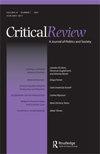Post-Truth and the Epistemological Crisis
IF 1.7
3区 社会学
Q4 POLITICAL SCIENCE
引用次数: 0
Abstract
ABSTRACT The polarization and charges of “post-truth” that mark contemporary politics may have its source, ultimately, in a crisis of epistemology, which is characterized by a tension between different forms of naïve realism—the view that reality appears to us directly, unmediated by interpretation. Perhaps too schematically, those on the right tend to be first-person naïve realists in treating economic and social realities as accessible to the ordinary political participant by simple common sense, while those on the left tend to be third-person naïve realists in treating credentialed experts as forming a consensus—a new common sense. In treating reality as transparent enough to be legible either to oneself or to a group of experts, both sides tend to treat disagreement as a motivational problem—a problem of bad faith, motivated reasoning, perversity, and refusal to see the truth—rather than as an epistemic problem caused by the possibility that each side may hold a different set of interpretive frameworks that determines how and what it sees of reality. In obviating the possibility of genuine disagreement, the epistemological crisis is quite naturally transformed into a political crisis.后真相与认识论危机
摘要当代政治中“后真相”的两极分化和指控,最终可能源于认识论危机,其特征是不同形式的天真现实主义之间的紧张关系——即现实直接出现在我们面前,不受解释的影响。也许过于模式化了,右翼倾向于第一人称天真现实主义者,将经济和社会现实视为普通政治参与者可以通过简单的常识获得的,而左翼倾向于第三人称天真现实论者,将有资格的专家视为形成共识——一种新的常识。双方都倾向于将分歧视为一个动机问题——一个恶意、动机推理、变态的问题,以及拒绝看到真相——而不是作为一个认识问题,因为每一方都可能持有一套不同的解释框架,这些框架决定了它如何以及如何看待现实。在排除真正分歧的可能性时,认识论危机很自然地转变为政治危机。
本文章由计算机程序翻译,如有差异,请以英文原文为准。
求助全文
约1分钟内获得全文
求助全文
来源期刊

Critical Review
POLITICAL SCIENCE-
CiteScore
1.30
自引率
12.50%
发文量
17
期刊介绍:
Critical Review: A Journal of Politics and Society is a political-science journal dedicated to advancing political theory with an epistemological bent. Recurrent questions discussed in our pages include: How can political actors know what they need to know to effect positive social change? What are the sources of political actors’ beliefs? Are these sources reliable? Critical Review is the only journal in which the ideational determinants of political behavior are investigated empirically as well as being assessed for their normative implications. Thus, while normative political theorists are the main contributors to Critical Review, we also publish scholarship on the realities of public opinion, the media, technocratic decision making, ideological reasoning, and other empirical phenomena.
 求助内容:
求助内容: 应助结果提醒方式:
应助结果提醒方式:


